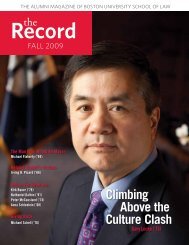the nature of representation: the cherokee right ... - Boston University
the nature of representation: the cherokee right ... - Boston University
the nature of representation: the cherokee right ... - Boston University
You also want an ePaper? Increase the reach of your titles
YUMPU automatically turns print PDFs into web optimized ePapers that Google loves.
122 PUBLIC INTEREST LAW JOURNAL [Vol. 15<br />
an agent or minister.” 159<br />
If Baldwin’s first option—that <strong>the</strong> deputy would have <strong>the</strong> <strong>right</strong> to sit in <strong>the</strong> body<br />
<strong>of</strong> Congress—is <strong>the</strong> proper reading, <strong>the</strong>n <strong>the</strong> deputy <strong>right</strong> would be highly<br />
analogous to <strong>the</strong> delegate <strong>right</strong> contained in <strong>the</strong> New Echota Treaty. However,<br />
Justices Johnson and Thompson accepted Baldwin’s second option in <strong>the</strong>ir<br />
dissents, namely that <strong>the</strong> deputy is merely an agent or minister. Johnson wrote:<br />
It is true, that <strong>the</strong> twelfth article gives power to <strong>the</strong> Indians to send a deputy to<br />
congress; but such deputy, though dignified by <strong>the</strong> name, was nothing and<br />
could be nothing but an agent, such as any o<strong>the</strong>r company might be<br />
represented by. It cannot be supposed that he was to be recognized as a<br />
minister, or to sit in <strong>the</strong> congress as a delegate. There is nothing express and<br />
nothing implied, that would clo<strong>the</strong> him with <strong>the</strong> attributes <strong>of</strong> ei<strong>the</strong>r <strong>of</strong> <strong>the</strong>se<br />
characters. As to a seat among <strong>the</strong> delegates, it could not be granted to<br />
him. 160<br />
Similarly, Thompson wrote in his separate dissent, “[n]o one can suppose that<br />
such deputy was to take his seat as a member <strong>of</strong> congress; but that he would be<br />
received as <strong>the</strong> agent <strong>of</strong> that nation.” 161 Though <strong>the</strong> Justices did not feel <strong>the</strong> deputy<br />
promise required Congressional recognition <strong>of</strong> a Cherokee delegate, <strong>the</strong>ir 1831<br />
interpretation in Cherokee Nation v. Georgia, formed <strong>the</strong> backdrop for <strong>the</strong> more<br />
substantive promise found in <strong>the</strong> New Echota Treaty <strong>of</strong> 1835. The<br />
communications and tentative agreements in <strong>the</strong> years between <strong>the</strong> Supreme Court<br />
ruling and <strong>the</strong> signing <strong>of</strong> <strong>the</strong> Treaty reveal <strong>the</strong> steps involved in moving from <strong>the</strong><br />
deputy to <strong>the</strong> delegate promise.<br />
2. The Agent Promise<br />
U.S. policy that actively supported a Cherokee agent formalized <strong>the</strong> dicta<br />
claiming that <strong>the</strong> deputy <strong>right</strong> was merely <strong>the</strong> <strong>right</strong> to an agent. The Cherokee<br />
Phoenix printed <strong>the</strong> Department <strong>of</strong> War’s removal advocacy, including <strong>the</strong> promise<br />
to <strong>the</strong> Cherokees that <strong>the</strong>y “shall have <strong>the</strong> privilege <strong>of</strong> appointing an agent, who<br />
shall reside at Washington, to communicate your claims and wishes to <strong>the</strong><br />
Government.” 162 Not surprisingly, Cherokee leaders desired more than a mere<br />
agent and, even among <strong>the</strong> non-Ross faction willing to negotiate with <strong>the</strong> U.S.<br />
government on <strong>the</strong> subject <strong>of</strong> removal, <strong>the</strong>re was <strong>the</strong> additional desire to receive a<br />
159<br />
Id. at 39; see also EVARTS, supra note 154, at 122 (supporting Baldwin’s first<br />
option:<br />
Though <strong>the</strong> treaty <strong>of</strong> Hopewell was formed under <strong>the</strong> old confederation, it is not <strong>the</strong><br />
less binding on that account; and good faith would now require, that <strong>the</strong> Cherokees<br />
should be allowed a privilege, as nearly as possible tantamount to what would<br />
have been <strong>the</strong> privilege <strong>of</strong> sending a deputy to <strong>the</strong> Old Congress.)<br />
160<br />
Cherokee Nation, 30U.S.(5Pet.)at25.<br />
161<br />
Id.at66.<br />
162<br />
Department <strong>of</strong> War, April 17, 1832,CHEROKEE PHOENIX, Aug. 10, 1833, at 2.









